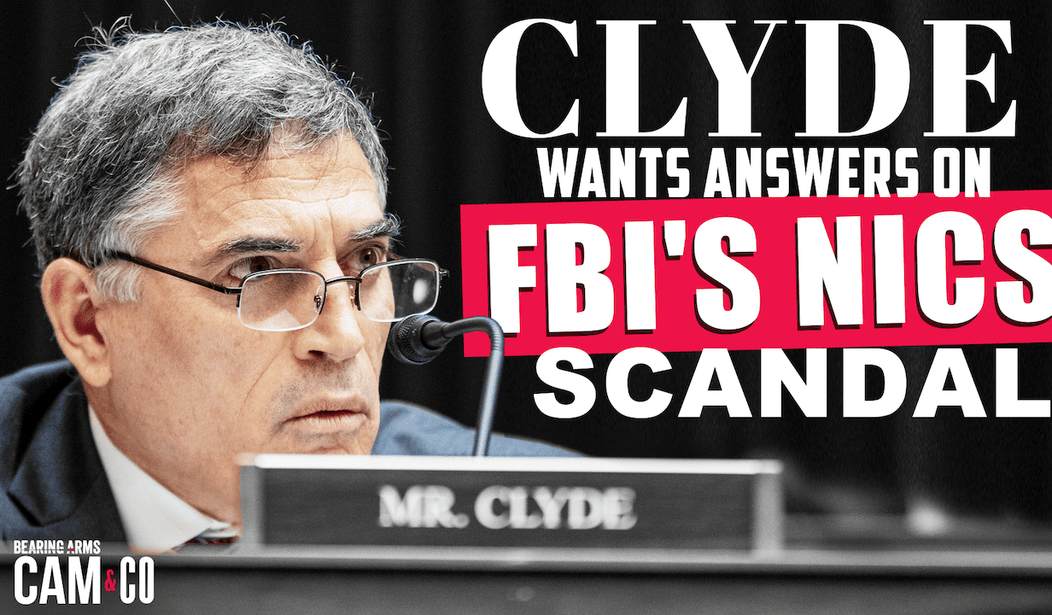Rep. Andrew Clyde (R-GA) is not only a Second Amendment supporter, he’s a federal firearms licensee and a longtime gun store owner. As such, he knows a thing or two about our nation’s gun laws, and he’s seriously concerned about the disturbing details (and unresolved questions) about a secretive government program that was used by at least three federal agencies to get more than a dozen (and perhaps many more) individuals to “voluntarily” sign away their right to keep and bear arms.
Clyde is my guest on today’s Bearing Arms’ Cam & Co, and that growing scandal is the main topic of our conversation.
“Can you imagine the FBI showing up at your door and wanting to inquire about your life and then saying ‘hey, here’s a form and if you fill it out that, you know, we’ll go away’? That’s just incredibly concerning,” says Clyde.
It also may very well be illegal. As Clyde points out, there’s no clear legal mechanism for someone to self-report themselves as a prohibited person, which is exactly what the FBI and other agencies “encouraged” some folks to do.
Signatories were registered with the FBI’s National Instant Criminal Background Check System and asked to declare that they were a “danger” to themselves or other people or lacking the “mental capacity adequately to contract” their lives. Many of the people targeted by the FBI in the past had reportedly made violent threats on social media, in chat rooms, and in person, internal records show.
“Good evening [redacted],” a Secret Service employee wrote to an FBI employee on March 30, 2018. “Attached is a NICS self-submission form for [redacted] (DOB: [redacted].”
“His USSS case number is 127-679-0044105,” the email continued, noting it was sent from a supervisory protective intelligence research specialist. “If you have any questions, please let me know. Thank you.”
The email was attached with a form intended to waive the gun rights of the signatory, records show. The Washington Examiner was unable to verify the date that the form was signed.
Separately, an email from June 4, 2018, also sheds light on the Secret Service’s usage of the form. A Secret Service employee wrote to an FBI employee: “Can you please enter [redacted] into NICS and advise me when it has been entered. Thank you.”
Clyde tells Bearing Arms that based on the documents obtained and released by Gun Owners of America in their FOIA lawsuit seeking information on the self-reporting scheme, he’s been unable to determine where the form used actually originated. With Democrats in control of House and Senate committees, it’s also been impossible to compel the FBI to produce some answers about the use of the forms and who approved them, but says that will change when the 118th session kicks off with Republicans in control of the House.
“Whether we actually have an open public hearing on it is one thing, but a lot of our work actually happens behind closed doors,” Clyde explains. “Things like depositions, demand letters, and subpoenas and things of that nature. We may have a public hearing and we may not, but I will tell you we will get to the bottom of it, and we’ll get to the truth of the matter here…. it will be something that will warrant congressional time.”
I certainly hope so. The details of this particular scandal may not be as salacious as those involving Hunter Biden, his laptop, or even the gun that he purchased despite declaring on the Form 4473 that he was not an unlawful user of drugs, but secret forms being used to get Americans to sign away a fundamental individual right (perhaps in violation of federal law) is definitely worth the time and attention of every member of Congress who gives a damn about civil liberties.









Join the conversation as a VIP Member